“Rishikesh.”
“What’s up?”
“Rafting, of course.”
Now try this.
“What’s up this weekend?”
“Going rafting.”
“Where?”
“Rishikesh, of course.”
Once upon a time famed as the ‘world capital of yoga’, The Beatles came visiting Rishikesh in 1968 and John Lennon recorded the memorable The Happy Rishikesh Song. Amidst lots of blue-grey smoke, hallowed chants and exhilarating yoga, the group went on to compose nearly 50 songs during their stay at a now-closed ashram. Such was the lure. And the lore. Today, though numerous ashrams cloak this city by the Ganges in Uttarakhand, the focus has shifted to pursuits more heart-thumping from soul-searching. The new-found reputation was sealed when Brad Pitt flew in quietly just over a year ago and seared down the rapids. On a rainy June morning as clouds swelled up against a misty-green hilly backdrop, I walked along a boulevard by the fulvous, frothy Ganges. The water, not far to my left, plunged among half-submerged boulders and flooded into furious eddies. A moment of fervent calm before it threw itself against the protruding rocks into battered white foam again. Standing waist-deep in this melee was a dreadlocked swami, gazing intently as if to capture this momentary calm and freeze it in time. The divine de rigueur of the day were ringing to a start when I took the Ram Jhula across to the cluster of ashrams and temples on the other side of the river.
Emboldened by the emptiness of the early morning hours, pilgrims and picaroons alike were busy on their haunches converting every available shock or stubble into a roadside lavabo. A bulky South Indian woman in a flapping gaucho and carrying a wailing newborn was busy seeking out the temple of some favourite deity in the pious maze of haphazardly stacked temples. The veneration was milling up to reach an acme in a few hours when the place would be thronging with devotees – most of them making a beeline for the historic Geeta Bhawan and Swarg Ashram. During my round of the holies, I made friends with a cheery Brahmin priest who initiated me to the legend of the place. “Of course you know Ram killed Ravan?” He asked with twinkling eyes.
I nodded I did.
“After killing the demon king, Ram felt bad about taking a life and did his penance here.” He swayed his hands in a semi-arc as if the ‘here’ encompassed anywhere from the small room where we sat to beyond. I looked around and he laughed.
“No, not here,” he said trying hard to suppress his laughter. “But Rishikesh, I meant.”
“And when Ram was in penance, his brother Laxman visited him. He crossed the river – more dangerous at that time – using just a jute rope.” Admiration was writ large on his crease-less smooth face.
“Today, we have built the Laxmanjhula (jhula meaning ‘bridge’) on the same place so that people like us don’t have to be adventurous.” He said fondly rubbing his extravagantly protruding belly with a sneery laugh bordering on the sinister. He also told me about the Ganga Aarti at the nearby Triveni Ghat where prayers to the Ganges were offered by its banks facing a Shiva statue in the evening – a picturesque ritual not to be missed. I could, if I wished, come in early and help in cleaning up the place before the red carpet was laid out for the bhajans and prayers. I said I would.
“You must be very brave to do that.” He warned with a meaning I didn’t miss, doubling up, bellowing with laughter.
I left him still trying hard to gag his guffaws as he chanted mantras and poured holy water over the baby of the south Indian woman who was still wailing, only louder. Back across the river in the townside, I stood watching an inflatable dinghy filled up with superhuman effort by a young North Eastern boy with a hand pump as big as himself. Towards the end of the ordeal – after each of the crooks and nannies and the seats and brims are bouncy full – the chap goes up in air every time along with the piston; the only way he can bring it down is by gliding his entire body weight over the handle. Anticipating a good workout, I proffered my service which was smilingly accommodated. All it took me was a full five minutes before I landed on all fours with the pump beneath me, stuck like an advanced backbone. After making my bookings for a level five, full day rafting the next day, I hired a boat that would take me across to a secluded camp upriver. I wanted to know what lay on the other side of the hills that rose like a protective canopy over the besmirched Ganges. A benign eye over the river which gushingly embraces both the wading pilgrim and the floating adventurer. So benign I almost expected Ram to be still sitting somewhere up there and Laxman up to some youngblood bravado.
Scattered houses show signs of newfound wealth: thatched roofs have been replaced with concrete, uncertain but utilitarian extensions have been added to the main building and exhaust pipes from western toilets rise up like proud minarets. Each house is nestled amidst their own farmland where they grow fruits and vegetables. The azure blue sky stretches over the Garhwal horizon – known as Kedarkhand in the ancient texts – all the way to the foothills of the Himalayas. Step on a mound of freshly tilled earth and dung beetles scurry for cover. A little lamb was gambolling about, trying to cajole its mother into a game. The Arcadian bliss is broken by a loud blaring out of ‘Sheila ki Jawani’ from a nearby house and I stared long in disbelief tinged with displeasure.
“I think my brother is home,” said Mahender Singh Rana a trifle apologetically. “He usually comes on weekends, I think this time he didn’t get any work. So he must have come early.”
Mahender was my boatman and guide. He was the local rockstar. Tall and charming with an ever-ready smile, he epitomised a generation-in-transition. Sons of army men or farmers, youngsters like Mahender didn’t go for either. Instead they tied their futures to the booming tourism industry. They steered rafts, guided treks and went as helpers for mountaineering expeditions. Mahender himself had scaled the Kanchenjunga twice; something he is justifiably proud of. He showed me photographs at his home over a simple meal of bhatt (a type of soya) and rice.
“My father, sometimes I also assist him.”
I looked at him a bit incredulously.
“Mostly my brother helps him.” He conceded with a wry smile.
“When I am not busy with the tourists, I help in running the camp next door.” He pointed to some tent heads visible over the terrace like newly sprung mushrooms.
“You take them around?”
“No,” he replied a trifle reluctantly. “I don’t generally take Indians around. For them adventure is about maximum boozing, reckless bonfires and sex wherever you fancy.”
“That’s one kind of adventure.” I said testily.
“Maybe,” Mahender was not convinced, of course. “Trekking, mountaineering, rafting are all about teamwork. Our countrymen have a problem taking instructions.”
“We are a democracy.”
“They hire us for our expertise and they think we are the ones who should listen to them…” I realised a tad too late that I had opened a can of worms.
“You could be right…”
“But not the foreigners, they hire us and even share the load equally…”
Concur or contest, his opinions were shaped over the years. There was nothing much for me to do. I decided to light my aarti or lamp that evening for Mahender. That he may get more foreign tourists.
Wanderink recommends: More respect for the guides and support staff who are hired for their expertise – whether be it their knowledge of the terrain, climbing or tracking or cooking skill. Remember, you wouldn’t be able to do it if it weren’t for them.



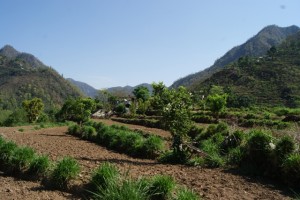
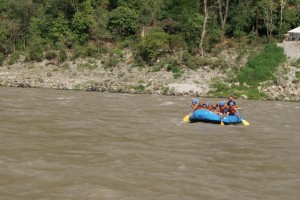
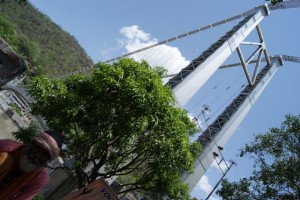
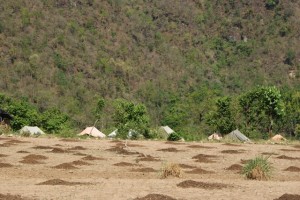
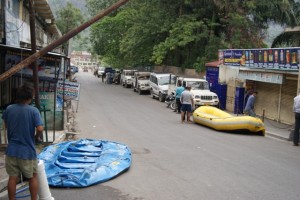
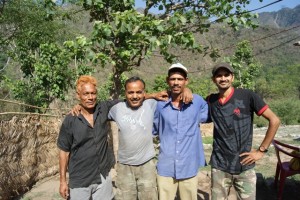






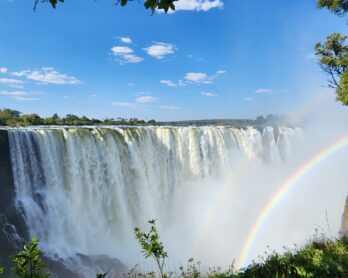
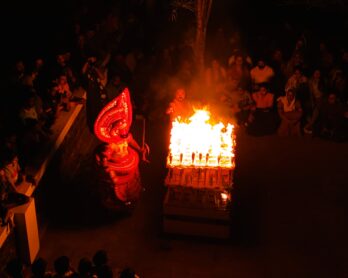

I like it that we both went to the same place and saw “different” things. I had a more top-down perspective whereas yours went beyond that, I like that you saw people in the larger picture, more bottom-upish…
Oh yes, you cutting down on your sleep is worth it cos now I get to see another Rishikesh!!
this has the feel of a novel thomma, exceptional writing!!